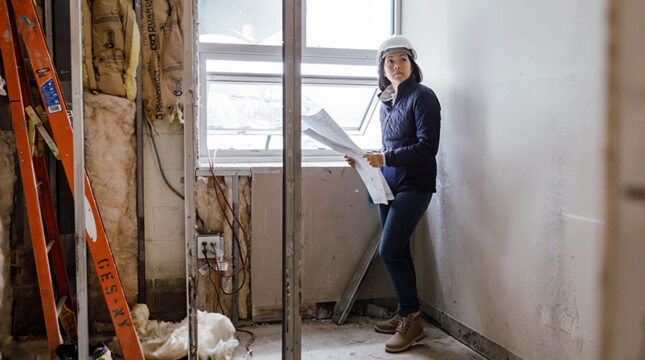How to get a general contractor license in Colorado
Since local governments in Colorado regulate general contractor licensing, the process will vary by location. Most areas only require a contractor to be licensed if they perform work requiring a building permit.
Start by contacting the local government in the areas where you plan to work.
In most areas, contractors must have a minimum of years of experience working under another licensed contractor before getting a license.
Many local areas do not honor reciprocity agreements, meaning you can’t earn your license in one Colorado city and use it to work in another. As a result, contractors will typically need to obtain multiple licenses (and meet multiple requirements) when working in different cities within the state.
Types of Colorado general contractor licenses
There are several types of licenses, but not all license types are offered in all municipalities. Many municipalities, including Longmont and Boulder, classify general contractor licenses into three categories:
Class A license: This is the broadest license type. It allows contractors to work on any building project, regardless of size. Contractors with a Class A license may not work on plumbing, electrical, mechanical, fire extinguishing or elevators unless they obtain trade-specific licenses in those areas.
Class B license: Contractors with this license can work on most residential and commercial building projects, except those designated as IA or IIA by the International Building Code. Class B contractors may not work on specific trades without holding additional licenses.
Class C license: Contractors with this license are limited to construction projects involving residential buildings for single-family dwellings or multi-family dwellings. The dwellings must not have more than three stories or four living units. Contractors may not work on specific trades without holding additional licenses.
Colorado contractor license requirements
In most cases, contractors must pass an International Code Council (ICC) exam to qualify for a license. Many areas in Colorado use the ICC national standards exams for Class A, B and C licenses.
Some urban areas, such as Denver, use specific ICC local tests in conjunction with the national exams, depending on the contractor’s chosen specialty.
General contractor licenses in Denver
Denver is the largest market for general contractors in Colorado, but the city also has the most restrictive licensing process.
The Denver Office of Community Planning and Development issues contractor licenses.
Applicants must hold a supervisor certificate, employ someone who holds a supervisor certificate or be a state-licensed electrical contractor or plumbing contractor.
Once you meet the initial requirements, you’ll also need to complete these additional application steps:
- Read Chapter 1 of the Denver Building and Fire Code.
- Complete the licensing application and specify the license classification you want.
- If you are not a state-licensed electrician or plumber, you’ll need to provide a “Supervisor Statement of Responsibility” from the supervisor certificate holder in your company.
- If you are a state-licensed electrician or plumber, you’ll need a copy of your current Contractor card issued by Colorado and a copy of your Master Electrician/Master Plumber ID card.
- Provide documentation from the Secretary of State outlining the legal business status of your contracting company (LLC, Corporation, sole proprietorship, etc).
- Submit your completed application, reference forms, proof of any required ICC exam scores and applicable fees to the Denver Community Planning & Development Office, either through the online portal or delivered to the Contractor Licensing Desk.
How long does it take to get a general contractor license in Colorado?
Once you meet the requirements and submit your application form, it will generally take a few weeks to review, depending on the municipality. Mail-in applications may also take longer than applications submitted online or in person.
In Denver, for example, applicants are told to expect anywhere from 14 to 20 business days for application review, while the Larimer County Chief Building Official will issue all licenses within seven business days of receiving a completed application.
Common challenges for obtaining a license
Because every local area sets its own licensing requirements in Colorado, it can be challenging to navigate the application process. Some areas require licenses at the city level, while others manage them at the county level.
Some jurisdictions provide information and FAQs online, while others handle contractor license applications primarily in person. To minimize delays in processing your application, visit your local office as soon as possible before your project starts.
Get to know the government employees who can be a helpful resource in both obtaining your license and facilitating the process.
Colorado license renewal requirements
Most general contractor licenses in Colorado will need to be renewed every one to three years. Common requirements include:
- An application.
- Renewal license fee.
- An updated certificate of insurance coverage.
Some local areas may have additional renewal requirements, such as a codes exam to test knowledge of recent building code changes. Most jurisdictions will also deny renewals for contractors with unresolved building code issues.
Insurance requirements for Colorado general contractors
Getting business insurance in Colorado is a must for contractors. Here are the most common types of coverages:
General liability insurance
Contractors are generally required to show proof of coverage for a minimum level of liability insurance in Colorado to receive a license. The exact coverage amount can vary by license type, location or type of work being performed.
Most areas require a general liability policy with at least a $100,000 policy limit to get a license. Urban areas or areas with larger building contractor projects may require higher coverage levels.
Here are a few examples of liability insurance requirements for various locations in Colorado:
Pikes Peak Regional Building Department requires general contractors holding a Class A license to carry $500,000 in combined single limit liability and contractors holding a Class B or C license to carry $300,000 in combined single limit liability insurance.
Larimer County requires general contractors holding a Class A, B or C license to hold $1 million in combined single limit liability insurance. Or contractors holding a single trade license, roofing license or mechanical license must hold $300,000 in combined single limit liability insurance.
The City of Longmont requires general contractors to hold $1 million in combined single limit liability, $2 million in general aggregate liability and $2 million in products completed aggregate liability insurance.
Workers’ Compensation insurance
The state of Colorado requires all employers to have workers’ compensation insurance. When employees become ill or injured at work, workers’ compensation can help cover medical expenses and lost wages.
Tools and Equipment insurance
Contractors can repair or replace job-related tools with tools and equipment insurance. This coverage can cover loss or damage from fire, theft, vandalism and more.
Commercial Auto insurance for general contractors
Commercial auto insurance is not required for all general contractors. However, Colorado state law requires any business owners that have company-owned vehicles to carry commercial auto insurance. The amount of coverage required depends on the size and use of the vehicle.
Colorado mandates the following minimum coverages:
- $25,000 for each person in an accident;
- $50,000 for all persons in any one accident; and
- $15,000 for property damage in any one accident.
Commercial Property insurance
Commercial property insurance can help protect the property you rent or own for your business by providing coverage for damage and vandalism.
How NEXT supports Colorado general contractors
NEXT Insurance helps small business owners find the right business insurance coverage for local requirements at an affordable price.
Use our painless online process to explore options, purchase coverage and access your certificate of insurance in a matter of minutes. If you have questions, our U.S.-based licensed advisors are standing by to help.
Get an instant quote today.
Do you have projects in a different U.S. state? Visit our summary of general contractor license requirements in every state.
This information has been provided as a service. It is correct and up-to-date to the best of our knowledge; however, it is in no way intended to offer legal advice and you must always consult with local authorities before you make any business decisions. Regulations and requirements may change at any time.





